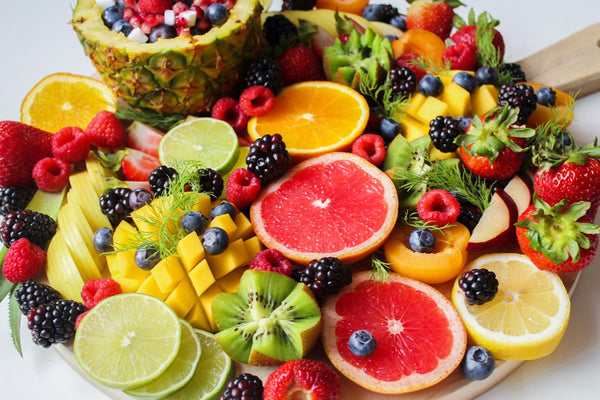What is the Fruitarian Diet?
The fruitarian, or fruit, diet is yet another entry in the long-list of highly restrictive fad diets to enter the spotlight.
As the name implies, a fruitarian diet entails eating only fruit and excludes all animal products, including dairy (and by proxy whey protein powder).
Some fruitarian diet adherents also allow for the consumption (in moderation) of other raw vegetables, dried fruits, nuts, and seeds.
Basically, there is no one “specific” way to run the fruitarian diet as some fruitarians consume only fruit that has been freshly picked from local farmers, while others allow for the consumption of any fruits (regardless of its source).
Still others, as we just mentioned, allow for the consumption of all fruits and some other plant foods.
The common denominator among all fruitarians is that animal-based products are a no-go.
Furthermore, most other types of food, such as grains, legumes, etc., are limited or eliminated completely.
Generally speaking, cooked food, including cooked fruit, is frowned upon.
Is a Fruitarian Diet Safe?
As you can probably guess, the fruitarian diet is woefully deficient in protein.
In other words, if you are looking to build muscle, gain strength, or achieve the ultimate body transformation, the fruitarian diet is definitely NOT the way to go about achieving your desired end goal.
Fruit is rich in vitamins, minerals, and antioxidants (which all support health, wellness, and longevity). They’re also high in fiber, which supports a healthy gut.
But, fruit contains next to no protein, which means building muscle (let alone maintaining it during a dieting phase) is a virtual impossibility.
Furthermore, protein is needed for more than muscle tissue. It is also needed to build and maintain all of your internal structures (ligaments, bones, organs, connective tissue, etc.) as well as your external ones too (skin, hair, nails, etc.).
Protein is also needed to create neurotransmitters (dopamine, adrenaline, noradrenaline) and hormones (such as insulin and growth hormone).
Since you aren’t able to obtain sufficient amounts of dietary protein or essential amino acids from fruit, following this diet long term will result in malnourishment, muscle loss, and numerous other unwanted complications (weakening of bones, thinning hair, headaches, difficulty sleeping).
Potential Benefits of the Fruitarian Diet
Fruits are packed with numerous vitamins, minerals, and antioxidants, including vitamin C, potassium, and beta-carotene.
It also contains fiber and water, which helps support gut health and hydration.
Additionally, some research indicates that regularly consuming fruit (as part of an otherwise healthy diet) is associated with lower risks of certain diseases and all-cause mortality.[1,2]
However...
Following a fruit-only diet significantly increases your risk of deficiencies for other essential micronutrients, including:
- Iron
- Vitamin D
- Calcium
- Zinc
- Vitamin B6
- Vitamin B12
- Omega-3 fatty acids
Is the Fruitarian Diet Good for Weight Loss?
Like any diet that reduces total calorie intake, you can lose weight following the fruitarian diet, but in addition to losing body fat, you will also lose a lot of muscle mass due to the lack of protein intake.
As you lose muscle, you are more susceptible to injury and bone fractures (since muscle provides cushion and protection for your bones), and your metabolism slows down, thereby making future weight loss even more difficult.
The Bottom Line on the Fruitarian Diet
Fruit is nature’s candy.
It’s sweet, indulgent, and packed with nutrition.
Fruit absolutely can (and most likely should) be included in your diet, whether your goal is building muscle, losing fat, or maintaining health and wellness.
However, just because fruit is healthy (and delicious) doesn’t mean it is the only thing that you should eat.
Fruit does contain lots of essential vitamins and minerals, but there are also several essential micronutrients that it is lacking, as we mentioned above.
Plus, following such a restrictive diet can foster an unhealthy relationship with food and lead to episodes of disordered eating and binging.
As we’ve said with other fad diet articles, moderation is key. There is no need to completely eliminate entire food groups or macronutrients from your diet to lose weight and get results.
There are so many delicious foods available, each with their own unique set of flavors and health benefits.
Why limit yourself to only a handful of options when you don’t need to?
By all means, eat a few servings of fruit each day, just make sure you’re also getting sufficient amounts of other healthy foods like vegetables, lean proteins, whole grains, and healthy fats.
References
- Aune D, Giovannucci E, Boffetta P, et al. Fruit and vegetable intake and the risk of cardiovascular disease, total cancer and all-cause mortality-a systematic review and dose-response meta-analysis of prospective studies. Int J Epidemiol. 2017;46(3):1029–1056. doi:10.1093/ije/dyw319
- Bill, F., & Foundation, M. G. (2019). Health effects of dietary risks in 195 countries , 1990 – 2017 : a systematic analysis for the Global Burden of Disease Study, 393. https://doi.org/10.1016/S0140-6736(19)30041-8






